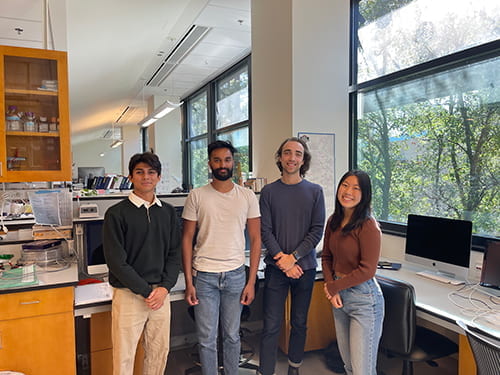Closing cell—and academic—gaps
UCSC’s Genomics Institute opens up the world of bioinformatics and programming to students

The genomics TA team from left to right: Daniel Arriaza, Vikas Peddu, Roman Reggiardo, Sarah Xia
Bayan Parrenas Shimizu | UCSC | November 04, 2022
Launched just last year, UC Santa Cruz Genomics Institutes summer research programs are already seeing unparalleled success.
Roman Reggiardo, Biomolecular Engineering and Mathematics Program Ph.D. candidate and Bioinformatics Summer Bridge instructor, witnessed this success firsthand.
The bioinformatics field was new territory for many of the summer program participants, Reggiardo says—many didn’t even realize the area of study existed. By the end of the summer program, however, it was something they were interested in pursuing as a career pathway.
“One of our students who was on scholarship is now doing a programming internship at NASA’s Ames lab,” he says.
The Genomics Institute began the Summer Short Course in Bioinformatics and Coding, and the Bioinformatics Summer Bridge Course in 2021. These courses—designed for for community college students and incoming UCSC students—strengthen a sense of belonging and broaden participation in genomics for first-generation college students and other historically underrepresented groups.
The Summer Short Course in Bioinformatics and Coding, taught online over the course of four weeks, provides students with fundamental skills in programming, data management and visualization, scientific research, and the study of genomics.
Gepoliano Chaves, a Science Without Borders fellow and SIP mentor working with the pediatric cancer neuroblastoma at the University of Chicago under Dr. Mark Applebaum, is an instructor for the course – having worked with Dr Raja GuhaThakurta for 7 years, whose course served as inspiration for the Genomics Institute’s new programs. Chaves notes the incredible impact the program has on students’ education and future careers.
“It’s pretty much 90 to 95% of students, who have never had an experience with programming, and it’s the first time they hear about biological concepts like DNA sequencing technologies,” Chaves said. “It’s an opportunity to get them exposed to that and have the mindset of what is expected or what’s going to be expected from them in their academic year.”
Zia Isola, the Diversity Director of the Genomics Institute Office, was inspired by astronomy professor Raja GuhaThakurta’s introductory python program. After seeing GuhaThakurta’s success in teaching students fundamental programming technical skills online and in a rapid and efficient timeframe, Isola had only one question:
“Why aren’t we doing this for our [Genomics] students?”
Isola, knowing that community college and transfer students rarely—if ever—have the chance to take Computer Science or Bioinformatics, saw a need for a way to bridge the educational gap. The Summer Short Course provides an introduction to Genomics for students who would normally find such courses inaccessible.
Course participants, many of whom have little to no experience in programming or bioinformatics, spend a month with Ph.D. level practitioners and researchers, gaining connections and skills.
“If they can do an intensive where they get these basic skills, then they can start applying them right away,” Isola says. “We want students to leave the workshops equipped with things that they can apply right now.”
Chaves sees the incredible potential put in the hands of his students through skills learned in the Summer Short Course.
“If you think about a disease like cancer, you need to understand a lot about the genetics and the gene expression that’s going on, and you cannot study or understand that without going through learning these techniques,” Chaves says.
As the Genomics Institute seeks to expand their program and provide access to these vital scientific skill sets, Isola still makes sure that these Bioinformatics courses stay true to their ideal of broadening participation even in the pedagogy of their instructors.
“We’re not just talking about reaching out to diverse participants,” Isola says.“We’re thinking about what we need to do on our end to make sure that our methods are inclusive and to make sure teaching is opening a door rather than putting up barriers.”
With courses like the Summer Short Course in Bioinformatics and Coding, and the Bioinformatics Summer Bridge Course, the Genomics Institute is throwing doors wide open.